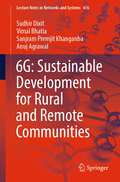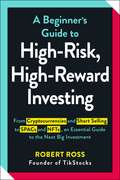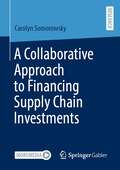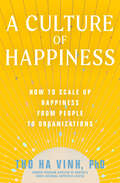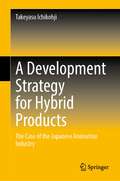- Table View
- List View
5th EAI International Conference on Management of Manufacturing Systems (EAI/Springer Innovations in Communication and Computing)
by Lucia Knapčíková Dragan Peraković Marko Periša Annamária BehúnováThe book presents the proceedings of the 5th EAI International Conference on Management of Manufacturing Systems (MMS 2020), which took place online on October 27-29, 2020. The conference covers the management of manufacturing systems with support for Industry 4.0, logistics and intelligent manufacturing systems and applications, cooperation management, and its effective applications. Topics include RFID applications, economic impacts in logistics, ICT support for Industry 4.0, industrial and smart Logistics, intelligent manufacturing systems and applications, and much more. The topic is of interest to researchers, practitioners, students, and academics in manufacturing and communications engineering.
6G: Sustainable Development for Rural and Remote Communities (Lecture Notes in Networks and Systems #416)
by Sudhir Dixit Vimal Bhatia Sanjram Premjit Khanganba Anuj AgrawalThe book covers a variety of feasible technology options, both wired and wireless, to enable 6G connectivity in rural and remote regions. Along with the enabling technology options, the book also covers important aspects such as human-computer interaction, business models for the local operator ecosystem, regulatory and right-of-way policies, security and privacy, and future challenges related to technology migration, urbanization, and scalability. A special feature of this book is that it covers both the optical and wireless technology aspects to realize 6G connectivity, which will be of interest to a broad range of researchers and practitioners. Detailed figures have been included in the book to cover both the fiber-optics and wireless aspects. These figures include telecommunication equipment and networks ranging from a locality to the under-sea cables to high latitude platforms. The book has simple explanations, pictorial representations, minimal math, and conversational language, which will enable all the readers to grasp it, thereby helping them in decision making and performing comprehensive analysis. This book includes the needs of the unconnected and under-connected sections of the society, notably from the rural and remote areas, when the 6G standards are being discussed and developed. This feature will help overcome the challenge of widening the digital divide from every new generation of mobile network standards. Hence, the book covers all technical and non-technical aspects to be of interest to researchers, decision-makers, academia, social workers, and the readers in technology, growth, and empowerment.
7 Rules of Power: Surprising- But True- Advice on How to Get Things Done and Advance Your Career
by Jeffrey PfefferIf you want to 'change lives, change organizations, change the world,' the Stanford business school's motto, you need power.Is power the last dirty secret or the secret to success? Both. While power carries some negative connotations, power is a tool that can be used for good or evil. Don't blame the tool for how some people used it.Rooted firmly in social science research, Pfeffer's 7 rules provide a manual for increasing your ability to get things done, including increasing the positive effects of your job performance.With 7 Rules of Power, you'll learn, through both numerous examples as well as research evidence, how to accomplish change in your organization, your life, the lives of others, and the world.
7 Rules of Power: Surprising--but True--Advice on How to Get Things Done and Advance Your Career
by Jeffrey PfefferIf you want to "change lives, change organizations, change the world," the Stanford business school&’s motto, you need power. Is power the last dirty secret or the secret to success? Both. While power carries some negative connotations, power is a tool that can be used for good or evil. Don&’t blame the tool for how some people used it. If fully understood and harnessed effectively, power skills and understanding become the keys to increasing salaries, job satisfaction, career advancement, organizational change, and, happiness. In 7 Rules of Power, Jeffrey Pfeffer, professor of organizational behavior at the Stanford University Graduate School of Business, provides the insights that have made both his online and on-campus classes incredibly popular—with life-changing results often achieved in 8 or 10 weeks. Rooted firmly in social science research, Pfeffer&’s 7 rules provide a manual for increasing your ability to get things done, including increasing the positive effects of your job performance. The 7 rules are: 1) Get out of your own way. 2) Break the rules. 3) Show up in powerful fashion. 4) Create a powerful brand. 5) Network relentlessly. 6) Use your power. 7) Understand that once you have acquired power, what you did to get it will be forgiven, forgotten, or both. With 7 Rules of Power, you&’ll learn, through both numerous examples as well as research evidence, how to accomplish change in your organization, your life, the lives of others, and the world.
8 Billion and Counting: How Sex, Death, and Migration Shape Our World
by Jennifer D. SciubbaA provocative description of the power of population change to create the conditions for societal transformation. As the world nears 8 billion people, the countries that have led the global order since World War II are becoming the most aged societies in human history. At the same time, the world’s poorest and least powerful countries are suffocating under an imbalance of population and resources. In 8 Billion and Counting, political demographer Jennifer D. Sciubba argues that the story of the twenty-first century is less a story about exponential population growth, as the previous century was, than it is a story about differential growth—marked by a stark divide between the world’s richest and poorest countries. Drawing from decades of research, policy experience, and teaching, Sciubba employs stories and statistics to explain how demographic trends, like age structure and ethnic composition, are crucial signposts for future violence and peace, repression and democracy, poverty and prosperity. Although we have a diverse global population, demographic trends often follow predictable patterns that can help professionals across the corporate, nonprofit, government, and military sectors understand the global strategic environment. Through the lenses of national security, global health, and economics, Sciubba demonstrates the pitfalls of taking population numbers at face value and extrapolating from there. Instead, she argues, we must look at the forces in a society that amplify demographic trends and the forces that dilute them, particularly political institutions, or the rules of the game. She shows that the most important skills in demographic analysis are naming and being aware of your preferences, rethinking assumptions, and asking the right questions. Provocative and engrossing, 8 Billion and Counting is required reading for business leaders, policy makers, and anyone eager to anticipate political, economic, and social risks and opportunities. A deeper understanding of fertility, mortality, and migration promises to point toward the investments we need to make today to shape the future we want tomorrow.
A 1.778 km de distancia. Cómo cuidar las relaciones en un mundo online
by Ferran Ramón-CortesDel autor de La isla de los 5 faros, con más de 100.000 ejemplares vendidos. Ferran Ramon-Cortés nos ofrece las claves para mejorar la comunicación virtual, fortalecer las relaciones y reconectar a las personas en un mundo online. Tras más de ocho horas enlazando videoconferencias, Ferran acaba una nueva jornada exhausto y frustrado. Recibe entonces un misterioso mensaje: «Apreciado Ferran: (...) desde hace más de un año estoy sumergido en la nueva comunicación virtual; vivo permanentemente conectado a mi familia, a mis amigos y a todo mi entorno, pero cada día me siento más alejado de todos y del mundo. (...) no sé si darle las gracias a esa nueva comunicación virtual o culparla de todo lo que me pasa. (...) Lo que es seguro es que busco respuestas. ¿Las tienes tú?». Acompañado de su fiel perra Nim, Ferran se embarcará en un nuevo viaje con la intención de encontrar respuesta a cinco preguntas clave: - ¿Funciona la comunicación online?- ¿Cómo afecta la comunicación virtual a nuestras relaciones?- ¿Trabajar online es una opción?- ¿Cómo podemos comunicarnos mejor online?- ¿Cómo podemos relacionarnos mejor (punto)? Una reflexión calmada, basada en investigaciones pioneras, en torno a los retos y las oportunidades de la comunicación virtual para las relaciones de hoy.
A Banker's Journey: How Edmond J. Safra Built a Global Financial Empire
by Daniel GrossWho was Edmond J. Safra? “The greatest banker of his generation,” in the estimation of a former World Bank President. The founder of four massive financial institutions on three continents, and a proud child of Beirut’s Jewish quarter. An innovative avatar of financial globalization, and a faithful heir to a tradition of old-world banking. The leading champion and protector of the Sephardic diaspora. In A Banker’s Journey, financial journalist and historian Daniel Gross, who, like Safra, traces his heritage to Aleppo, Syria, reconstructs the public life of an intensely private man. With exclusive access to Safra’s personal archives, Gross tracks the banker’s remarkable journey from Beirut to Milan, São Paulo, Geneva, and New York—to the pinnacle of global finance. Edmond Safra was fifteen in 1947, when his father sent him to establish a presence in Milan, Italy. Fluent in six languages, and with an eye for value, managing risk, and personal potential, Safra was in perpetual motion until his tragic death in 1999. The modern, global financial empire he built was based on timeless principles: a banker must protect his depositors and avoid excessive leverage and risk. In an age of busts and bailouts, Safra posted remarkable returns while rarely suffering a credit loss. From a young age, Safra assumed the mantle of leadership in the Syrian-Lebanese Jewish community, providing personal aid, supporting the communities that formed in exile, and championing Sephardic religious and educational efforts in Israel and around the world. Edmond J. Safra’s life of achievement in the twentieth century offers enduring lessons for those seeking to make their way in the twenty-first century. He inspired generations to make the world a better place.
A Beautiful Way to Coach: Positive Psychology Coaching in Nature
by Fiona ParasharLeaders need to renew and recharge regularly to lead more effectively. Forget the squeezed hour of coaching on Zoom or in a busy office – this book invites coaches and leaders alike to re-energise their style of executive coaching by stepping beyond traditional techniques and out of the office for an executive day retreat. Based on the award-winning framework of the Positive Vision Day programme, this accessible book introduces a new approach to coaching, combining time-out in a natural and beautiful setting with positive psychology. The book is designed to inspire coaches and leaders to take a day away from the desk, step into nature and renew their energy and purpose. As a coach, you are needed more than ever to help leaders align their strengths and values to their personal vision. This book does just that, and provides: Detailed exercises linking psychological underpinnings to the goals of each exercise, including how to avoid classic coaching pitfalls. Journaling prompts for self-reflection and self-coaching. Easy-to-understand models, templates, scripts and action steps for every stage of the process. The approach used in the book will be of particular interest to not only leadership and executive coaches, and internal executive coaches, but also career, entrepreneurship, business, wellbeing and life coaches, as well as leaders themselves who are mid-career or at a career or psychological crossroads.
A Beginner's Guide to High-Risk, High-Reward Investing: From Cryptocurrencies and Short Selling to SPACs and NFTs, an Essential Guide to the Next Big Investment
by Robert RossMake the best choices for your money and earn big with this guide to high-risk, high-reward investment strategies including options trading, investing in meme stocks, and the business of cryptocurrency.Your favorite sites are filled with the latest investment trends and stories of other people making bank by making smart moves in the market. But how can you get your own share of the wealth? A Beginner&’s Guide to High-Risk, High-Reward Investing can help you make sense of trends, from short selling to cryptocurrency and &“meme stock,&” breaking down the buzzwords to give you hard facts about the opportunities and risks of fringe investment strategies. With advice from expert Robert Ross, this easy-to-follow investing guide gives you everything you need to determine which high-risk, high-reward investment strategies are the best fit for your portfolio.
A Beginner's Guide to Structural Equation Modeling
by Tiffany A. Whittaker Randall E. SchumackerA Beginner’s Guide to Structural Equation Modeling, fifth edition, has been redesigned with consideration of a true beginner in structural equation modeling (SEM) in mind. The book covers introductory through intermediate topics in SEM in more detail than in any previous edition. All of the chapters that introduce models in SEM have been expanded to include easy-to-follow, step-by-step guidelines that readers can use when conducting their own SEM analyses. These chapters also include examples of tables to include in results sections that readers may use as templates when writing up the findings from their SEM analyses. The models that are illustrated in the text will allow SEM beginners to conduct, interpret, and write up analyses for observed variable path models to full structural models, up to testing higher order models as well as multiple group modeling techniques. Updated information about methodological research in relevant areas will help students and researchers be more informed readers of SEM research. The checklist of SEM considerations when conducting and reporting SEM analyses is a collective set of requirements that will help improve the rigor of SEM analyses. This book is intended for true beginners in SEM and is designed for introductory graduate courses in SEM taught in psychology, education, business, and the social and healthcare sciences. This book also appeals to researchers and faculty in various disciplines. Prerequisites include correlation and regression methods.
A Biophilic Design Guide to Environmentally Sustainable Design Studios (SpringerBriefs in Education)
by Lina Markauskaite Arianna Brambilla Niranjika WijesooriyaThis book explores the current challenges of teaching biophilic design within environmentally sustainable design (ESD) education. It shows how design frameworks and success matrices can be used within ESD education, explores the development of biophilic design frameworks and shows how design thinking can be used to adopt biophilic design within ESD education. It introduces the new 'Process Bridging Technique (PBT)' that can be used to generate sustainable design frameworks able to fulfil the requirements of a performance-based approach and, at the same time, enhance human-nature connectedness. Based on an educational design research project developed in the past two years at the University of Sydney, this book informs new approaches to ESD education and bridges the spheres of research, education, and profession. It serves as a practical guide on how to systematically develop a design framework that can be used in architecture education, while presenting the pioneering 'Process Bridging Technique' developed by the authors.
A Book of Open Shop Scheduling: Algorithms, Complexity and Applications (International Series in Operations Research & Management Science #325)
by Wieslaw KubiakThis book provides an in-depth presentation of algorithms for and complexity of open shop scheduling. Open shops allow operations of a job to be executed in any order, contrary to flow and job shops where the order is pre-specified. The author brings the field up to date with more emphasis on new and recent results, and connections with graph edge coloring and mathematical programming. The book explores applications to production and operations management, wireless network scheduling, and timetabling. The book is addressed to researchers, graduate students, and practitioners in Operations Research, Operations Management, computer science and mathematics, who are developing and using mathematical approaches to applications in manufacturing, services and distributed wireless network scheduling.
A Brief History of Equality
by Thomas PikettyThe world’s leading economist of inequality presents a short but sweeping and surprisingly optimistic history of human progress toward equality despite crises, disasters, and backsliding. A perfect introduction to the ideas developed in his monumental earlier books. It’s easy to be pessimistic about inequality. We know it has increased dramatically in many parts of the world over the past two generations. No one has done more to reveal the problem than Thomas Piketty. Now, in this surprising and powerful new work, Piketty reminds us that the grand sweep of history gives us reasons to be optimistic. Over the centuries, he shows, we have been moving toward greater equality. Piketty guides us with elegance and concision through the great movements that have made the modern world for better and worse: the growth of capitalism, revolutions, imperialism, slavery, wars, and the building of the welfare state. It’s a history of violence and social struggle, punctuated by regression and disaster. But through it all, Piketty shows, human societies have moved fitfully toward a more just distribution of income and assets, a reduction of racial and gender inequalities, and greater access to health care, education, and the rights of citizenship. Our rough march forward is political and ideological, an endless fight against injustice. To keep moving, Piketty argues, we need to learn and commit to what works, to institutional, legal, social, fiscal, and educational systems that can make equality a lasting reality. At the same time, we need to resist historical amnesia and the temptations of cultural separatism and intellectual compartmentalization. At stake is the quality of life for billions of people. We know we can do better, Piketty concludes. The past shows us how. The future is up to us.
A Casebook of Strategic Corporate Social Responsibility: Towards Business Sustainability (CSR, Sustainability, Ethics & Governance)
by Ananda Das GuptaThis casebook argues that corporate sustainability agendas should look beyond stakeholder demands and desires, towards strategic opportunities to achieve social and commercial benefits simultaneously. It encourages shifting focus from a strategic approach to a sustainable business practice. As the cases in the book highlight, it is in every company’s best interest to identify a manageable number of sustainability initiatives whose shared benefits—for society at large and the company—are significant and also substantially help the company strategically position itself in the competitive marketplace. Strategic sustainable business practices can lead to shared value creation, strengthening the company’s competitiveness and establishing a symbiotic relationship. Companies can achieve solid profits by doing good things for the environment; it is a “win-win” for society and for business. This casebook provides examples of multi-stakeholder partnerships that aim to create sustainable enterprises. Ideal for teaching purposes, after a brief introduction to the case method, the cases are presented with no comments or criticisms.
A Collaborative Approach to Financing Supply Chain Investments
by Carolyn SomorowskyCompetitive advantage is not achieved by a single company, but rather by the entire supply chain, with a focus on improving the flow of information, finance and goods. Improving these flows requires strategic investments relevant to the supply chain that are often long-term, capital-intensive, relationship-specific, and therefore risky. The past financial or COVID-19 crisis has made banks more risk averse, making it more expensive for supply chain members to finance risky investments or even more difficult to raise funds from external financial institutions. Supply chain finance is a young discipline that focuses on improving financial flows through a collaborative approach. Since most strategic investments are made by suppliers facing financial constraints, there is a high likelihood that supply chain disruptions will occur because the financing party becomes insolvent, or the investments do not materialize. To encourage strategic investments and avoid supply chain disruptions, a model is developed in which supply chain members leverage their financial and operational capabilities to realize these investments and share costs, risks, and benefits according to their contribution. The proposed model is based on a structured coalition game with transferable utility that determines the supply chain members best able to finance the investments without compromising supply chain stability.
A Comparative Study of Islamic Finance in Australia and the UK (Islamic Business and Finance Series)
by Imran LumThis book provides valuable insights into the practical challenges faced by the nascent Islamic finance industry and compares the Australian experience to developments in the UK. It contributes to a greater understanding of how Muslims living as a minority in Australia and the UK negotiate Islamic doctrine in secular societies by focusing on one aspect of this negotiation, namely the prohibition of ribā. There is little debate in the Islamic tradition on the prohibition of ribā. The differences, however, lie in the interpretation of ribā and the question of how Muslims live in a society that is heavily reliant on interest and conventional banking, yet at the same time adhere to Islamic guidelines. Through the words of religious leaders, Muslim professionals and university students, Imran Lum provides real accounts of how Muslims in Australia and the UK practically deal with conventional banking and finance products such as home loans, savings accounts and credit cards. He also explores Muslim attitudes towards Islamic finance and queries whether religion is the sole determining factor when it comes to its uptake. Drawing on his own unique experience as a practitioner responsible for growing an Islamic business in a conventional bank, Lum provides a firsthand account of the complexities associated with structuring Islamic finance products that are not only sharia compliant but also competitive in a non-Muslim jurisdiction. Using ṣukūk bonds as a case study, he highlights the tangible and non-tangible barriers to product development, such as tax and regulatory requirements and the rise of Islamophobia. Combining academic and industry experience, Lum unpacks the relationship of Islamic finance with Muslim identity construction in the West and how certain modalities of religiosity can lead to an uptake of Islamic finance, while others can lead toits rejection.
A Cost Based Approach to Project Management: Planning and Controlling Construction Project Costs
by Mehmet Nihat HaniogluA Cost Based Approach to Project Management: Planning and Controlling Construction Project Costs introduces early-career architects, construction managers, civil engineers, and facility managers to the essentials of delivering projects on-time and at cost. Drawing on the author’s decades of experience managing marquee building and infrastructure projects around the world, this primer offers busy professionals a crash course in budgeting, cost estimating, scheduling, and cost control. Chapters break down the details of cost elements, structuring project costs, and integrating budget with schedule, providing novice project managers with the key skills to plan and execute construction projects with confidence and precision. Features: Illustrates the principles of project management and the essentials of cost planning and control with easy-to-understand examples from the construction industry Includes step-by-step details of project planning, cost estimating, and management processes Offers clear, cost-based methods for defining scope, preparing bids, and planning for contingencies, as well as monitoring progress and determining when to take remedial action Contains a user-friendly guide to project management acronyms and terminology Provides sample construction schedules, budgets, and progress report forms An ideal resource for self-study, on-the-job training, or courses in construction, architecture, or civil engineering project management, A Cost Based Approach to Project Management makes a worthy addition to the aspiring project manager’s reference shelf.
A Culture of Happiness: How to Scale Up Happiness from People to Organizations
by Tho Ha VinhPractical principles for creating conditions for happiness at scale from the program director of the Gross National Happiness Center of Bhutan, the only country in the world to measure progress by the happiness of its citizens.Despite countless happiness programs focused on individual well-being, are we any happier, really? Is it in fact possible to be fully happy within a miserably dysfunctional society built to keep structures of inequity in place? Possible, perhaps, but not easy. While the pursuit of happiness is a much-celebrated ideal, how can countries and communities design the right environments for people to lead happy lives? Personal programs for happiness that include mindfulness, empathy, and gratitude are a good start, but without structural changes, they can only go so far. Taking the case of the country of Bhutan as an example, the nation's first Gross National Happiness program director Tho Ha Vinh explains how the principles of happiness can and must apply to people, families, and communities at scale to produce the conditions for a truly satisfying life. More and more people feel that we live in a time of transition and that our very survival on this planet depends on renewing the way we live together in society. Gross National Happiness is an innovative development paradigm that puts the interconnected happiness of all people and the well-being of all life forms at the center of progress. Based on real-life experiences, this book shows a multitude of practical methods for strategic thinkers and change makers to apply the framework of Gross National Happiness to bring about positive change in schools, businesses, and communities.
A Customer-oriented Manager for B2B Services: Principles and Implementation
by Valerie MathieuThe notion of customer orientation is becoming a necessity rather than a choice for many companies. It is a lasting response to competitive pressure and supports the company in a renewed definition of its mission, beyond direct economic gain. Within B2B services, the manager, through proximity to their team, their market and their client, is the essential actor in the deployment of this orientation.A Customer-oriented Manager for B2B Services provides managers with the knowledge and tools necessary to implement customer orientation themselves, with the involvement of their extended team. To this end, this book presents a four-step approach: understand the fundamentals of customer orientation in B2B services, know the customer, make the most of the offer and deliver the service.
A Developer's Essential Guide to Docker Compose: Simplify the development and orchestration of multi-container applications
by Emmanouil GkatziourasStart defining your infrastructure using Docker Compose and leverage it for everyday development or deploymentKey FeaturesDistribute your code in an easier way for developers to get startedSet up complex infrastructure for development and CI/CD purposesDeploy simple multi-container applications using Docker ComposeBook DescriptionSoftware development is becoming increasingly complex due to the various software components used. Applications need to be packaged with software components to facilitate their operations, making it complicated to run them. With Docker Compose, a single command can set up your application and the needed dependencies. This book starts with an overview of Docker Compose and its usage and then shows how to create an application. You will also get to grips with the fundamentals of Docker volumes and network, along with Compose commands, their purpose, and use cases. Next, you will set up databases for daily usage using Compose and, leveraging Docker networking, you will establish communication between microservices. You will also run entire stacks locally on Compose, simulate production environments, and enhance CI/CD jobs using Docker Compose. Later chapters will show you how to benefit from Docker Compose for production deployments, provision infrastructure on public clouds such as AWS and Azure, and wrap up with Compose deployments on said infrastructure. By the end of this book, you will have learned how to effectively utilize Docker Compose for day-to-day development.What you will learnCreate multi-container applications using Docker ComposeUse Docker Compose for daily developmentConnect microservices leveraging Docker network fundamentalsAdd monitoring to services leveraging PrometheusDeploy to production using Docker ComposeTranslate Compose files to Kubernetes deploymentsWho this book is forThis book is for software engineers, developer advocates, and DevOps engineers looking to set up multi-container Docker applications using Compose without the need to set up a Docker orchestration engine. It is also for team leads looking to increase the productivity of an organization's software teams by streamlining the provisioning of complex development environments locally using Docker Compose. Readers are expected to understand containerization and must possess fundamental Docker knowledge to get started with this book.
A Development Strategy for Hybrid Products: The Case of the Japanese Animation Industry
by Takeyasu IchikohjiThis is the first book that deals with technological innovation in Japanese animation industry from a management perspective. In reviewing prior research and explaining the history of the technology, the author raises the difficulty of dealing with new technologies. In particular, the focus is on systems that combine analog technology (drawing by hand) and digital technology (3D computer graphics or 3DCG) to create a product. This combined technology is referred to as "hybrid technology" in this book, and the development and management of "hybrid products" using this technology are studied. The study was conducted in two stages. The first stage was to determine the engineers’ (animators’) perception of hybrid technology. The results showed that in terms of potential, the hybrid technology of hand-drawn animation combined with 3DCG was rated more highly by engineers than hand-drawn alone. However, in terms of the assessment at that time, hybrid technology was rated higher than 3DCG alone but lower than hand-drawn. Therefore, it was assumed that hybrid technology, while useful, would pose challenges with respect to systematic implementation. The second stage was the development management of hybrid products. The results showed that the "adaptive engineer," who openly accepts other new technologies in the early stages of their emergence contributed to the integration of new and existing technologies.
A Director's Guide to Governance in the Boardroom: Across the Private, Public, and Voluntary Sectors
by Arturo LangaThis book is a practical guide for executive and non-executive directors and aspiring directors to lead, govern, and steer UK-based organisations to long-term sustainable success. In today’s turbulent environment, corporate governance is increasingly scrutinised, and this book will consider how directors can ‘bring the future forward’ with respect to responsible and ethical governance and leadership against the challenging political, environmental, and economic backdrop. While other books discuss UK corporate governance, this one uniquely demonstrates how the work of directors can build an organisation’s antifragility, and offers a view of stewardship approaches to every sector and type of UK organisation, from large premium listed companies to start-ups, the public sector, not-for-profits, partnerships, and family-owned and private-equity-backed organisations. Aspiring and experienced directors will each benefit from this book as well as those who provide board evaluation services, professional advisers, auditors, and those who provide training and other support for board members.
A Director's Guide to Governance in the Boardroom: Across the Private, Public, and Voluntary Sectors
by Arturo LangaThis book is a practical guide for executive and non-executive directors and aspiring directors to lead, govern, and steer UK-based organisations to long-term sustainable success. In today’s turbulent environment, corporate governance is increasingly scrutinised, and this book will consider how directors can ‘bring the future forward’ with respect to responsible and ethical governance and leadership against the challenging political, environmental, and economic backdrop. While other books discuss UK corporate governance, this one uniquely demonstrates how the work of directors can build an organisation’s antifragility, and offers a view of stewardship approaches to every sector and type of UK organisation, from large premium listed companies to start-ups, the public sector, not-for-profits, partnerships, and family-owned and private-equity-backed organisations. Aspiring and experienced directors will each benefit from this book as well as those who provide board evaluation services, professional advisers, auditors, and those who provide training and other support for board members.
A Dream Defaulted: The Student Loan Crisis Among Black Borrowers
by Jason N. Houle Fenaba R. AddoA Dream Defaulted explores how the student loan crisis disproportionately affects Black borrowers and why rising student debt is both a cause and consequence of social inequality in the United States.Jason N. Houle and Fenaba R. Addo offer a deft analysis of the growing financial crisis in education, examining its sources and its impacts. Based on more than five years of ongoing qualitative and quantitative research, this incisive work illustrates how the student loan system has not benefited all students equally. The authors tell the story of how first-generation college students, low-income students, and students of color are disadvantaged in two opposing phases of the process: debt accumulation and debt repayment. They further demonstrate that policies intended to mitigate financial burden and prevent default have failed to assist the people who most need help.Houle and Addo present these social and racial disparities within a broader context, tracing how centuries of institutionalized racism have contributed to social and economic inequities, perpetuating the racial wealth gap and leading to intergenerational inequality. Through interviews with borrowers, they illuminate the ways in which racial disparities affect who has college access, how and why people take on debt, and who has the ability to repay student loan debt after leaving college.Recognizing that the affordability crisis cannot be solved by higher education reform alone, Houle and Addo consider solutions. They argue that policy must extend beyond debt reduction and financial aid to address entrenched patterns of racial inequality and racial discrimination, both inside and outside institutions of higher education.
A Female Activist Elite in Italy (1890–1920): Its International Network and Legacy
by Manuela Mosca Elena LaurenziThis book explores and traces the progressive activism and radical ideas of several elite women in Italy beginning in the early 20th century. It discusses the shared political culture that shaped the thinking and the activity of these women, mainly oriented towards political philanthropy and work, seen as the cornerstone of a comprehensive redefinition of gender relations. It also discusses the connections linking them to an international network of women involved in similar political actions and economic initiatives addressing women’s' interests, as well as their legacy for the next generations. With essays from a range of scholars, this book provides an interdisciplinary framework for understanding these activists and deals with methodological and historiographical issues in reconstructing women’s contribution to history.

